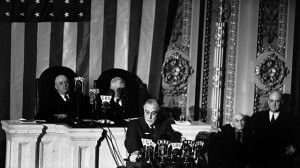This post originally appeared at OurFuture.org.
In his New York Times column last Friday, “The Spiritual Recession” (June 27, 2014), conservative David Brooks posed the same question he essentially first posed 17 years ago in “A Return to National Greatness: A Manifesto for a Lost Creed” (Weekly Standard, March 3, 1997): “What is the country for?”

President Franklin D. Roosevelt delivering his famous ‘Four Freedoms’ speech to the joint session of Congress on January 6, 1941. (AP Photo/George R. Skadding)
And yet, no more than he did in 1997 does Brooks effectively answer that question today. But, of course, as a conservative he cannot. How could he possibly appreciate and write informatively of America’s purpose and promise – the promise inscribed in our historical memory and imagination by Paine’s “Common Sense,” Jefferson’s Declaration, the Founders’ Preamble to the Constitution and Bill of Rights, Lincoln’s Gettysburg Address, FDR’s Four Freedoms and King’s “I Have a Dream” speech? How could he appreciate the promise that inspired not just a revolutionary war but also generations of Americans to struggle to expand both the “We” in “We the People” and the democratic process through which “the people” can genuinely govern themselves?
Nevertheless, that does not mean we can simply dismiss Brooks’ question.
Then a writer and editor at Bill Kristol’s Weekly Standard, Brooks wrote “A Return to National Greatness” because he believed America’s governing class had dangerously abandoned the idea that America possessed world-historic purpose and promise – dangerous, Brooks explained, quoting Tocqueville, because “Democracy has a tendency to slide into nihilistic mediocrity if its citizens are not inspired by some larger national goal.”
Brooks opened the essay by celebrating the ruling class of the late 19th-century Gilded Age for its commitment to the idea that “America’s mission was to advance civilization itself.” He then proceeded, no doubt to the chagrin of his political and intellectual comrades, to actually praise mid-20th-century liberals for their own sense of America’s historical purpose and promise and their determination to “accomplish some great national endeavor” such as “Wilson’s Fourteen Points, the New Deal, John F. Kennedy’s New Frontier.”
Finally, after lambasting liberals for deferring to the New Left and embracing both “radical egalitarianism” and the notion that the “personal” was “political,” Brooks turned his attentions to the right, not to applaud his comrades’ vision of national greatness, but to arraign them for having none. As he saw it, his fellow right-wingers were giving up the idea that the United States was endowed with special purpose and promise and essentially disabling themselves and the nation by pressing for “localism” over “federalism” andenthusiastically embracing “populism” versus “elitism” – to the point of leaving no opening for national projects and no room for leadership, in Jefferson’s words, by a “natural aristocracy.”
But Brooks wrote not merely to chastise. He did so to urge conservatives to think again, to change their course and to develop a national project. He had no particular project in mind. In fact, he wrote: “It almost doesn’t matter what great task government sets for itself, as long as it does some tangible thing with energy and effectiveness.” In short: Just do it.
It is easy to criticize Brooks’ call for “A Return to National Greatness.” For example, his praise for America’s Gilded Age ruling classes obscures the brutality of their rule. And while he does not hesitate to cite Democrats Wilson and Kennedy, he seems incapable of mentioning Franklin Roosevelt, whose vision of the New Deal, the Four Freedoms and an Economic Bill of Rights clearly trumps the former figures in terms of the pursuit of National Greatness – not to mention that FDR’s 12-year presidency entailed the making of the Greatest Generation, the most progressive generation, in American history. But far more tragically, the right apparently took hold of Brooks’ argument about “It almost doesn’t matter what great task government sets for itself…” – and took us right into Iraq.
Now – in response to an essay by Mark Lilla in The New Republic, “The Truth About Our Libertarian Age: Why the Dogma of Democracy Doesn’t Always Work” – Brooks returns to the question of America’s purpose and promise. However, in contrast to his earlier piece, “The Spiritual Recession: Is America Losing Faith in Universal Democracy?” is not exactly a call for action. It is a lament – a lament that Americans “have lost faith in their own gospel.” Which was? That the United States has a mission: “When the U.S. was a weak nation, Americans dedicated themselves to proving that democracy could last. When the U.S. became a superpower, Americans felt responsible for creating a global order that would nurture the spread of democracy.” But today, he says, “The nation is tired, distrustful, divided and withdrawing. Democratic vistas give way to laissez-faire fatalism: History has no shape. The dream of universal democracy seems naive. National interest matters most.”
In conclusion, holding left and right equally responsible for the loss of faith, he observes worryingly that “if America isn’t a champion of universal democracy, what is the country for?”
Again, it is easy to take apart Brooks’ argument. It not only makes no direct reference to how the Bush administration lied us into a war in Iraq. No less crucially, it also makes no reference to the 40-year-long war from above that the right and conservative rich have pursued against working people – all too often with the deference of Democrats – and how that class war has gutted the middle class; threatened, in places suppressed, the rights of workers, women and minorities; and restored Gilded Age inequalities of wealth and power.
And yet, for all of that, we should not ignore Brooks’ question: “What is America for?”
As the state of the nation, not to mention our own distance from political power and influence, attest, we too have failed to answer that question in a compelling way. We have lost touch with the progressive tradition that articulated and sustained the vision of America as a grand experiment in freedom, equality and democracy. And as a consequence we have for too long allowed the right to redefine America’s purpose and promise in favor of empowering and enriching corporations and the propertied and suppressing or dampening popular democratic hopes, aspirations and energies.
Indeed, if we truly want to build a populist majority – if we truly want, as FDR put it in 1930, “to make America fairly radical for a generation” – if we truly want to enhance American democratic life and prosperity for all, then we must answer Brooks’ question. Recent progressive victories are encouraging, but the majority of Americans are still waiting to hear what we have to say. We need to articulate America’s democratic purpose and promise anew and remind ourselves and our fellow citizens what it means to be an American.
The views expressed in this post are the author’s alone, and presented here to offer a variety of perspectives to our readers.


